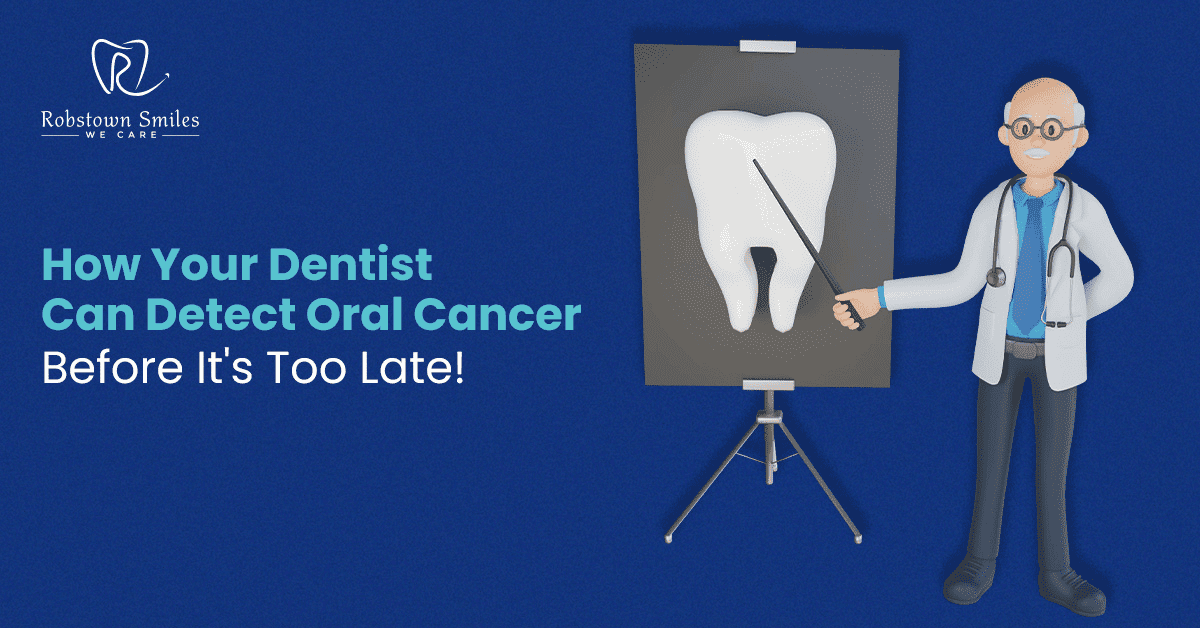Oral cancer is a major health concern that could affect millions of people. In order to improve treatment results and survival rates, early detection of oral cancer is essential. It may come as a surprise, but regular dental checkups can really help your dentist find oral cancer.
Recent research from the Oral Cancer Foundation found that dentists find about 84% of cases of oral cancer when they are still in their early stages, greatly increasing the likelihood of successful treatment for patients.
Exploring Oral Cancer
Oropharyngeal cancer and carcinoma of the oral cavity are two subtypes of oral cancer. Lips, gums, tongue, cheeks, and the floor or roof of the mouth are the most common sites of oral cavity cancer. Tonsils, basal tongue, throat, and soft palate are all potential sites of oropharyngeal cancer.
Both kinds, if left untreated for too long, can lower a person’s standard of living.
Identifying the Early Warning Signs of Oral Cancer
The key to early detection of oral cancer is being aware of the signs. Some common symptoms that should be taken into consideration include: swelling, lumps, red or white patches in the mouth, chronic hoarseness, trouble swallowing, and unexplained bleeding in the mouth.
Denture fit alterations, ear ache, and a chronic sore throat are among possible additional symptoms. Any of these symptoms, even though they could be caused by anything else, need immediate attention from a dentist or doctor if they last more than two weeks.
The First Line of Defense Against Oral Cancer: Dentist Checkups
Preventing oral cancer through routine dental exams is a top priority. Dentists conduct comprehensive oral exams as part of regular checkups and are qualified to detect any unusual changes in the mouth. The oral tissues, including the lips, gums, tongue, and throat, will be visually examined for any indications of concern.
To further aid in the early detection of oral cancer screening technologies can be utilized by dentists. The VELscope is a fluorescent light-based instrument for the detection of pathological tissue alterations.
If a dentist finds a lesion that seems suspicious, they may extract a little piece of tissue (a biopsy) to send to the lab for additional examination. Dentists can increase the likelihood of a good treatment outcome for oral cancer by using these instruments and strategies to detect cases early on.
Significance of Early Detection of Oral Cancer
Results from treatment and chances of survival from oral cancer are greatly affected by how quickly the disease is detected. Rather shockingly, whereas 83% of people with locally advanced oral cancer will still be alive after five years, that number drops to 38% for those with more advanced illnesses.
Early detection of oral cancer improves treatment options, which in turn may lessen the need for aggressive medicines and increase patient outcomes. Consequences like as deformity, extensive operations, and a lower quality of life can be catastrophic when oral cancer is in its late stages.
One way people may take charge of their oral health is by going in for frequent dental checkups. This will raise the likelihood of finding oral cancer in its early stages.
Conclusion
When it comes to fighting oral cancer, your dentist is an invaluable ally in addition to being a supplier of oral health services. Together, we can make a huge difference in preventing and identifying oral cancer before it’s too late if everyone stays watchful and makes their oral health a priority. Concerned about the possibility of developing mouth cancer? Get screened for oral cancer at Robstown Smiles today, make an appointment right away.

